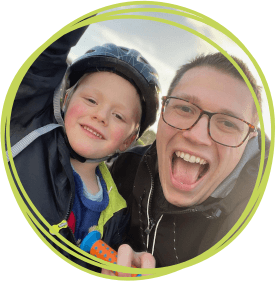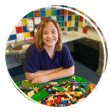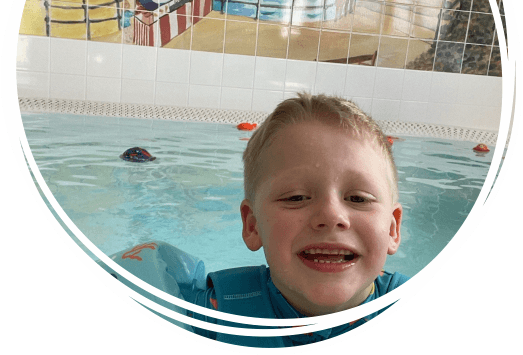
Josh and Sam are your typical cheeky brothers, playing with toys, bickering, and keeping parents Tim and Ruth on their toes in their family home in Plymouth. But what sets these boys apart, is Sam is a 10-year-old with no medical conditions, but his 6-year-old brother Josh has a rare, severe case of epilepsy.
The past 6 years have been tough for the family, with Josh’s condition putting a strain on what should be happy family memories like Christmas and first days back at school. But Little Harbour provides a place for them to enjoy quality time together.
Ruth remembers the exact dates and times of Josh’s medical history, and Tim laughs as she speaks saying, “It was all a blur for me.”
Ruth had a normal pregnancy and birth. However, at just 5 weeks old, Josh had his first episode. After being in hospital 2 nights for observations, the family returned home. Less than 48 hours later, another episode occurred, and they were straight back to hospital where it was identified Josh was having seizures. “Then it all kind of snowballed from there”, said Ruth.
_0.png)
The family were told on Christmas Day 2017 that Josh had epilepsy and needed to begin medication that day. From the point of his very first seizure, to his diagnosis, it had only been a week. It was Josh’s first Christmas, yet it was all such a blur for the family.
For the 4 weeks that Josh was in hospital, his older brother Sam was staying with his grandparents.
Ruth said: “Sam would wake up in the morning, and neither of us were there, because we both had to be with Josh. We had this tiny baby, and we didn’t know what was happening with him. It was a rocky and emotional time; we didn’t know what was going on or what the future was going to look like.”
Genetic testing revealed that the cause of Josh’s epilepsy was a mutation on the KCNA2 gene, and at the point of diagnosis there were only 50 cases worldwide. Due to the rarity of the disease, there is a lack of information regarding prognosis, other comorbidities and even treatment.
Ruth said: “We were naïve at that point, we didn’t know much, we didn’t know anything.”
The family have trialled lots of different medications, finally reaching a stage where Josh now takes 3 anti-epilepsy drugs twice daily. Josh has recently had surgery to implant a vagus nerve stimulation device (VNS) to reduce the number and severity of his seizures.
Despite the number of seizures Josh is having dramatically reducing due to his medication, each is still life-threatening. They now generally occur every couple of months, but they do not respond to any emergency medication administered by his parents or in A&E, and Josh regularly experiences status epilepticus, requiring a drug-induced coma with intubation.
Ruth said: “We don’t know when these will happen, we have an emergency protocol to follow written by his consultant, but it’s just so unpredictable, there is no trigger or warning signs. Josh has camera monitoring overnight, because we physically cannot stay awake all night to watch over him.
Because it has escalated so many times now, we’ve grown kind of numb to it. When paramedics ask what usually happens, I say, give it an hour and a half and he’ll be in a coma, and they just look at you in shock. But that’s his normal, unfortunately it’s not an alien concept for us anymore.
What should be happy times of year for the family, are now triggering and stressful, as Josh has ended up in intensive care and in hospital over Christmas for 2 years.
Alongside the epilepsy, Josh has global development delay and is behind with his speech, balance and also struggles to sleep.
_0.png)
“We’ve been really fortunate to get him into, what I would argue, is the best special needs school in Plymouth,” said Ruth. A nurse who works at the school was the one who suggested referring the family to Little Harbour.
Ruth said, “We’d heard of Children’s Hospice South West (CHSW), but at no point thought that was anything we’d need to be linked to. Most people have a misconception that a hospice is just end of life care, but there’s so much more to it than that.”
Despite not knowing what to expect when they first walked in, from the very first day the family visited Little Harbour, it has felt like home.
“It was really nice and informal”, said Ruth.
It was very much, you’re here, and we’re glad you’re here.
Josh is very settled and happy during visits to Little Harbour. He’s built strong relationships with the nurses and loves to run up and down the corridors chasing them, play in the soft play and spend time in the sensory room.
Ruth said: “A night of uninterrupted sleep is unheard of for us. Coming to Little Harbour means we know we can sleep because of the incredible nursing team looking after Josh and its comforting to know they are all able to spot the signs of a seizure starting. We know that he’s happy, comfortable and safe. It’s a familiar place for him now, and he’ll even go and eat breakfast with the team looking after him, meaning we can sleep in and know he’s fine.
The family value the quality time they get to spend together at Little Harbour, like being in the pool or having a change of scenery in the outside spaces.
_1.png)
Ruth said: “There’s plenty of things inside for them to engage with and there’s plenty of people for them to interact with, without everything falling on our two shoulders. It’s still in the back of our minds when we’re at Little Harbour, that question of will he be alright tonight? But we don’t have to carry that pressure because we know someone will come and find us if he’s not alright. We’re not constantly listening out and looking at a camera.”
Ruth said: “Our educational psychologist at school described it like you’re flying a plane and are constantly on high alert."
A lot of families don’t have to live like this, but we are always on high alert. And we’re just waiting for that crash to happen. We’re just waiting for it, and knowing that it’s coming, because that’s his condition.
Tim said: “We’re always on high alert, but when we come to Little Harbour, we get the space to breathe and have downtime, not just for the boys individually, but for all of us as a family, it’s like catching up on life a little bit.”









